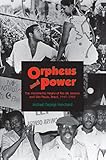Orpheus and Power : The Movimento Negro of Rio de Janeiro and São Paulo, Brazil 1945-1988 / Michael G. Hanchard.
Material type: TextPublisher: Princeton, NJ : Princeton University Press, [1998]Copyright date: ©1994Edition: Course BookDescription: 1 online resource (216 p.)Content type:
TextPublisher: Princeton, NJ : Princeton University Press, [1998]Copyright date: ©1994Edition: Course BookDescription: 1 online resource (216 p.)Content type: - 9780691002705
- 9781400821235
- 305.800981
- F2659.A1
- online - DeGruyter
- Issued also in print.
| Item type | Current library | Call number | URL | Status | Notes | Barcode | |
|---|---|---|---|---|---|---|---|
 eBook
eBook
|
Biblioteca "Angelicum" Pont. Univ. S.Tommaso d'Aquino Nuvola online | online - DeGruyter (Browse shelf(Opens below)) | Online access | Not for loan (Accesso limitato) | Accesso per gli utenti autorizzati / Access for authorized users | (dgr)9781400821235 |
Frontmatter -- CONTENTS -- ACKNOWLEDGMENTS -- INTRODUCTION -- PART ONE: RACIAL HEGEMONY -- ONE Racial Politics: Terms, Theory, Methodology -- TWO. Brazilian Racial Politics: An Overview and Reconceptualization -- THREE. Racial Democracy: Hegemony, Brazilian Style -- PART TWO: NEGATION AND CONTESTATION -- FOUR. Formations of Racial Consciousness -- FIVE. Movements and Moments -- SIX. Racial Politics and National Commemorations: The Struggle for Hegemony -- SEVEN: Conclusion -- NOTES -- APPENDIX -- BIBLIOGRAPHY -- INDEX
restricted access online access with authorization star
http://purl.org/coar/access_right/c_16ec
From recent data on disparities between Brazilian whites and non-whites in areas of health, education, and welfare, it is clear that vast racial inequalities do exist in Brazil, contrary to earlier assertions in race relations scholarship that the country is a "racial democracy." Here Michael George Hanchard explores the implications of this increasingly evident racial inequality, highlighting Afro-Brazilian attempts at mobilizing for civil rights and the powerful efforts of white elites to neutralize such attempts. Within a neo-Gramscian framework, Hanchard shows how racial hegemony in Brazil has hampered ethnic and racial identification among non-whites by simultaneously promoting racial discrimination and false premises of racial equality. Drawing from personal archives of and interviews with participants in the Movimento Negro of Rio de Janeiro and Sao Paulo, Hanchard presents a wealth of empirical evidence about Afro-Brazilian militants, comparing their effectiveness with their counterparts in sub-Saharan Africa, the United States, and the Caribbean in the post-World War II period. He analyzes, in comprehensive detail, the extreme difficulties experienced by Afro-Brazilian activists in identifying and redressing racially specific patterns of violation and discrimination. Hanchard argues that the Afro-American struggle to subvert dominant cultural forms and practices carries the danger of being subsumed by the contradictions that these dominant forms produce.
Issued also in print.
Mode of access: Internet via World Wide Web.
In English.
Description based on online resource; title from PDF title page (publisher's Web site, viewed 30. Aug 2021)


